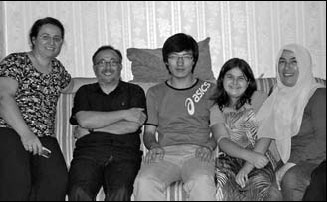A journey deep into the heart of Turkey
|
|
|
Chinese student Guan Bo stays with Ali Imanci's family in Turkey. Provided to China Daily |
Wang Zhaopeng has just returned to Beijing after spending a year as an exchange student in Turkey's Ankara University.
Of his many cherished memories the one that is still fresh in his mind is of the Shanghai Cultural Week held there.
Wang, whose major is the Turkish language, recalls how the stunning acrobatics and Shaolin martial arts wowed Ankara's audience.
"The very next day, my Turkish friends were asking me to teach them kungfu," he says.
Despite the Xinjiang Cultural Week of 2006 and Henan Culture Week of 2007, Wang says Turks know little about China. He says he and his classmates were often asked basic questions about the country by other Turkish classmates.
Beijing Foreign Studies University (BFSU), one of the nation's most prestigious foreign universities, has 20 students majoring in Turkish, including Wang. The university recruits Turkish major students every four years.
Li Zhiyu, one of BFSU's teachers of Turkish says their four-year Turkish-language major program was begun in 1985.
The first two years are devoted to picking up basic language skills, with students being put through classes in Turkish history, politics and culture, from the third year. Outstanding students are given the opportunity to study in Turkey for one year.
"While the 2003 batch of graduates work mainly for the government, those graduating in 2007 are mostly with trade corporations. Increasing bilateral trade holds even better prospects for the 2011 graduates," Li says.
According to the National Bureau of Statistics of Turkey, in the first seven months of 2010, Turkish exports to China totaled $1.24 billion and imports $9.01 billion, a respective increase of 76 and 36.8 percent over the previous year.
According to Li, besides BFSU and the Communication University of China, the Shanghai International Studies University too will soon be offering a major in Turkish.
Zhou Jiang, a BFSU graduate, has warm memories of the time she spent in Ankara and particularly of the Turks' friendly and helpful nature.
Guan Bo, another graduate, has similar stories. Guan worked as Chinese teacher for a 10-year-old girl named Deniz Imanci, whose father, a lawyer named Ali Imanci, is interested in Chinese antiques. When Guan showed the family pictures of China, they were amazed by how modern it looked. "It was very different from what they thought," Guan says.
At his farewell party, Ali's family made traditional Turkish food, and Guan and his classmate Mao Jingsong showed off their Chinese dishes.
Li Zhiyu and her students admit that most Turks often mistake the Chinese for Japanese or Korean but hope more cultural exchanges will create better understanding. "Two thousand years ago, our ancestors built relations with the Turks through the ancient Silk Road, and now we feel honored to be the bridge between the two nations," Li adds.
 0
0 








Go to Forum >>0 Comments